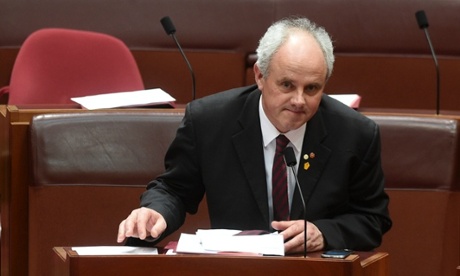Liberal Cory Bernardi uses UN declaration on rights of women to argue for banning Medicare benefits for such abortion

A bill to stop women receiving Medicare benefits if they have a gender-selective abortion could be part of a creeping move towards making abortion more difficult to access, a Labor senator has warned.
The Senate debated the private member’s bill, introduced by independent John Madigan, which amends the legislation which gives women access to Medicare for abortions, with the Liberal senator Cory Bernardi using the UN’s declaration on the rights of women to argue in favour of the ban.
Bernardi acknowledged there was “very little, maybe no evidence” of termination for sex selection purposes in Australia but said the Senate should be prepared to discuss personal and moral issues.
“It is unacceptable for taxpayer money to be used to allow one, even one, abortion on gender selection [grounds],” he said.
Bernardi spoke about the UN’s declaration on the rights of women and said stopping abortion based on gender selection empowered women because boys were usually the preferred sex in the case of gender-based abortions.
“Are we prepared to uphold rights of girls and women? Are we prepared to address the multiple manifestations of gender discrimination?” he said.
“This is not a choice based in anything but selfishness, terminating a child based on gender is the most selfish decision anyone could make.”
Bernardi said there was also a broader philosophical debate to be had on whether abortion available for any reason was the right thing for Australia.
The Labor senator Sue Lines said nobody in the chamber was arguing for abortion based on gender but warned against the potential consequences of the bill.
“Bills are often crafted over time so abortion becomes more difficult to access,” she said.
Her colleague, Claire Moore, rebuked Bernardi indirectly for using the UN declaration on the rights of women when she spoke in opposition to the bill.
She said while she condemns terminating a pregnancy because of unhappiness with the gender, she did not believe there is evidence that it is a widespread practice in Australia. She said the core issue was a “medical” one which also brings in personal rights and privacy.
“If you are concerned about the issue of abortion in Australia, take up the debate on those issues, do not hide behind putting a guilt trip on women about possible choices they make and hiding behind an argument that is based on the very document created to ensure women are empowered,” Moore said.
Liberal senator Chris Black, a former vet, spoke in favour of the bill and went into biological detail.
“Foetuses have the capacity to somehow understand in circumstances they might not survive post-foetal life. Natural miscarrying does occur because of some innate capacity of the foetus to understand it won’t survive post-foetal life,” he said.
He reflected that all embryos in the beginning are female.
“Some people may be distressed to know maleness is actually suppressed femaleness,” he said.
Greens senator Richard di Natale said the Greens would vote against the bill.
“It’s intruding, I believe, on a very personal medical decision which is a very important decision to be taken by a woman, her medical practitioner and any other person she chooses to engage in that decision,” he said.
Natale said the issue being debated was not gender-selective abortion, but abortion itself.
The bill was not voted on and will be brought before the Senate again next year.
